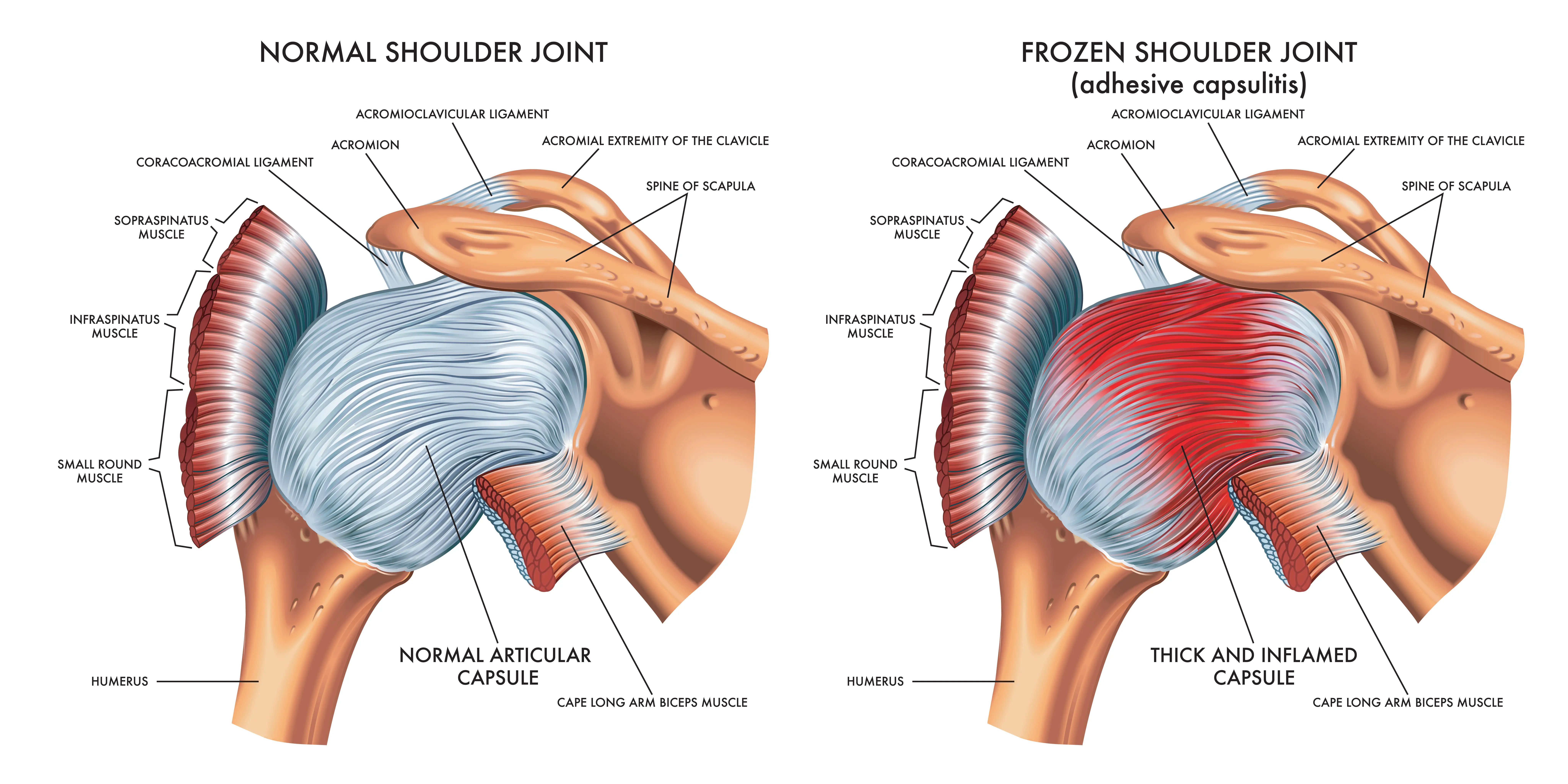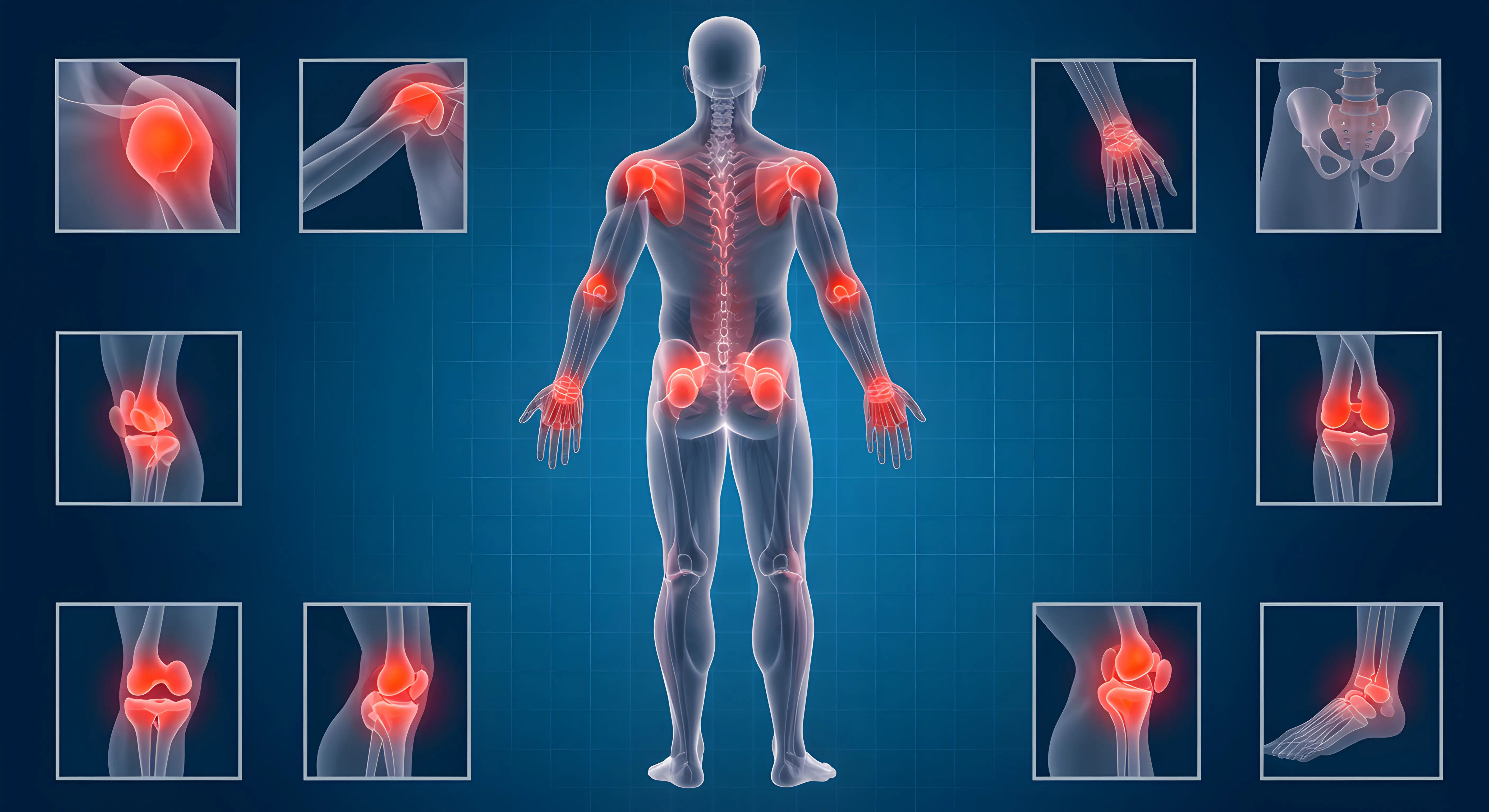How to Treat Frozen Shoulder: A Complete Recovery Guide
Learn how to treat frozen shoulder with stage-specific care, effective home exercises, physical therapy, and advanced medical treatments. Discover recovery timelines and tips to regain shoulder mobility.


Introduction
That deep, aching pain in your shoulder that makes it impossible to reach for a cup in the cabinet or slip on a jacket could be a sign of frozen shoulder. Medically known as adhesive capsulitis, this condition restricts your shoulder's movement, wrapping your joint in a painful stiffness that feels like it might never go away. If you're searching for how to treat frozen shoulder, you're likely seeking relief and a clear path to recovery. The good news is that with the right approach, most people can overcome it.
This comprehensive guide will walk you through everything you need to know, from understanding the stages and causes to exploring the most effective treatments, including home exercises, professional therapies, and advanced medical care. Let's break free from the stiffness together.
What is Frozen Shoulder? Understanding Adhesive Capsulitis
Frozen shoulder is a condition characterised by stiffness, pain, and a significant loss of range of motion in the shoulder joint. The term "adhesive capsulitis" is telling: the shoulder capsule, a strong connective tissue surrounding the joint, thickens, becomes tight, and develops bands of tissue called adhesions. Inflammation causes pain, and the resulting stiffness makes the shoulder feel literally frozen. The condition develops slowly in distinct stages and can take months or even years to fully resolve.
The Three Stages of Frozen Shoulder
Understanding the stages is crucial because the approach to treatment changes depending on which phase you are in.
Stage 1: The Freezing (Painful) Stage
This initial stage can last from 6 weeks to 9 months. Pain gradually increases, often worsening at night and disrupting sleep. You may notice a slight limitation in movement, but pain is the dominant feature. The shoulder is beginning to freeze.
Stage 2: The Frozen (Adhesive) Stage
Lasting typically from 4 to 12 months, the intense pain may subside in this phase. However, stiffness remains and may worsen. Performing daily activities becomes extremely difficult as the joint capsule becomes thick and tight.
Stage 3: The Thawing Stage
This is the recovery phase, where you gradually regain range of motion. It can last from 6 months to 2 years or more. Some may never regain 100% of pre-condition mobility without targeted intervention.
Consult Top Specialists for Personalised Tips
How to Treat Frozen Shoulder: Non-Surgical Methods
Most frozen shoulder cases are successfully managed with non-surgical treatments. The goal is to manage pain, preserve movement, and eventually restore range of motion.
Stage 1 Treatment: Managing Pain and Inflammation
During the painful freezing stage, aggressive stretching can be counterproductive. The focus should be on pain control.
Rest and Activity Modification: Avoid movements that cause sharp pain, but continue gentle use of the arm to prevent stiffness.
Pain Relievers: Over-the-counter NSAIDs, such as ibuprofen or naproxen, can help reduce pain and inflammation.
Heat and Cold Therapy: Warm showers or heating pads can relax muscles before gentle stretching. An ice pack applied for 15 minutes after activity can reduce acute pain.
Corticosteroid Injections: Injections directly into the shoulder joint can provide strong anti-inflammatory effects, offering significant pain relief for several weeks.
Consult a doctor online with Apollo24|7 if your pain is severe and sleep is disrupted.
Stage 2 & 3 Treatment: Regaining Motion with Physical Therapy
As pain decreases, focus shifts to physical therapy. A therapist will guide you through exercises to restore movement.
Top 5 Frozen Shoulder Stretches and Exercises
Pendulum Stretch: Lean slightly forward, letting your affected arm hang down. Swing gently in small circles for 30 seconds to a minute, 1–2 times a day.
Towel Stretch: Hold a towel behind your back with your good arm and gently pull it upward to raise the affected arm. Hold for 15–30 seconds.
Finger Walk: Face a wall and slowly "walk" your fingers up as high as comfortably possible, then slowly lower.
Cross-Body Reach: Use your good arm to lift the affected arm at the elbow and bring it across your body. Hold for 15–30 seconds.
Armpit Stretch: Place your affected arm on a shelf about breast-high, bend your knees slightly, and open your armpit gently. Hold for 15–30 seconds.
Advanced Non-Surgical Procedures
If therapy progress is slow, doctors may recommend:
Joint Distension (Hydrodilatation): Sterile water is injected into the joint capsule to stretch tissue and tear adhesions, improving range of motion.
Transcutaneous Electrical Nerve Stimulation (TENS): A device delivers mild electrical currents to interfere with pain signals.
Surgical Treatment Options
Surgery is considered only after 6–12 months of consistent non-surgical treatment has failed. The two main options are:
1. Manipulation Under Anaesthesia (MUA)
Under sedation, the doctor moves your shoulder to break adhesions and scar tissue, immediately increasing range of motion.
2. Arthroscopic Surgery
A minimally invasive procedure in which a small camera (arthroscope) and instruments are inserted into the joint to cut through tight portions of the capsule and remove adhesions. This is often followed by MUA. If conservative methods fail, book a visit with an orthopaedic specialist via Apollo24|7.
Home Remedies and Lifestyle Adjustments
Simple home remedies and lifestyle changes can complement professional treatment:
Gentle Stretching: Perform daily exercises to maintain flexibility and prevent stiffness.
Heat Therapy: Use warm showers, heating pads, or warm compresses to relax muscles and reduce discomfort before stretching.
Cold Therapy: Apply ice packs for 10–15 minutes after activity to reduce inflammation and acute pain.
Modify Daily Activities: Avoid heavy lifting or overhead movements, but do not completely immobilise the shoulder.
Adaptive Techniques: Bring items closer instead of reaching high or behind to reduce strain while keeping the shoulder moving.
Posture and Ergonomics: Maintain good posture and ensure proper sleep positions to minimise shoulder stress.
Light Aerobic Activity: Engage in gentle activities such as walking to promote overall circulation and healing.
How Long Does It Take to Recover?
Recovery time varies based on stage, individual health, and consistency of treatment:
Freezing Stage: Lasts several months with gradually increasing pain.
Frozen Stage: Can persist for 4–12 months; stiffness is the main issue.
Thawing Stage: Gradual recovery of motion may take 6 months to 2 years or more.
Consistency is Key: Regular exercises, pain management, and adherence to therapy significantly improve recovery outcomes.
Gradual Progress: Even small improvements over time contribute to regaining full shoulder function.
Can You Prevent Frozen Shoulder?
While not all cases are preventable, the risk can be reduced with proactive care:
Maintain Shoulder Mobility: Regular gentle exercises and stretches help prevent stiffness.
Manage Underlying Conditions: Control diabetes, thyroid disorders, and other health issues that increase susceptibility.
Avoid Prolonged Immobility: After injury or surgery, gradually increase shoulder activity instead of complete rest.
Ergonomic Adjustments: Modify daily tasks to reduce strain on the shoulder.
Early Intervention: Address shoulder pain or restricted movement promptly to prevent progression.
Conclusion
Dealing with a frozen shoulder can be frustrating and painful, but it is a manageable condition. Understanding the stages and applying the right treatment at the appropriate time, whether gentle pain management, consistent physical therapy, or advanced medical procedures, makes recovery possible. Patience and consistency are essential, and it is important to listen to your body while actively working on mobility. By combining stage-specific exercises, lifestyle adjustments, and professional guidance when needed, you can regain comfortable, fluid movement and reduce stiffness. Start with gentle stretches today and take the first step towards thawing your frozen shoulder.
Consult Top orthopedics
Consult Top Specialists for Personalised Tips

Dr. Anil Pradeep Jadhav
Orthopaedician
23 Years • MBBS MS (Ortho)
Nashik
Apollo Hospitals Nashik, Nashik
(25+ Patients)

Dr. Suraj Prakash
Orthopaedician
5 Years • MBBS, MS (Ortho)
Bengaluru
Apollo Clinic, Indiranagar, Bengaluru

Dr. Padam Singh Gautam
General Physician/ Internal Medicine Specialist
43 Years • M.B.B.S (WARDHA M. S.), F.A.G.E. (MANIPAL), F.A.I.M.S. (Pb.), M.A.I.M.S. (Pb.), M.R.S.H. (LONDON)
Noida
Dr Padam Singh Gautam Fracture Clinic, Noida

Dr. Susheel B
Orthopaedician
13 Years • MBBS, MS, Ortho Fellowship in Trauma ( Germany) Fellowship in Arthroscopy and Arthroplasty ( Switzerland)
Bengaluru
Apollo Medical Center, Marathahalli, Bengaluru

Prof. Dr. Jambu N
Orthopaedician
23 Years • MBBS, M.S Ortho, FRCS ,FACS
Chennai
Apollo Speciality Hospitals Vanagaram, Chennai
(150+ Patients)
Consult Top orthopedics

Dr. Anil Pradeep Jadhav
Orthopaedician
23 Years • MBBS MS (Ortho)
Nashik
Apollo Hospitals Nashik, Nashik
(25+ Patients)

Dr. Suraj Prakash
Orthopaedician
5 Years • MBBS, MS (Ortho)
Bengaluru
Apollo Clinic, Indiranagar, Bengaluru

Dr. Padam Singh Gautam
General Physician/ Internal Medicine Specialist
43 Years • M.B.B.S (WARDHA M. S.), F.A.G.E. (MANIPAL), F.A.I.M.S. (Pb.), M.A.I.M.S. (Pb.), M.R.S.H. (LONDON)
Noida
Dr Padam Singh Gautam Fracture Clinic, Noida

Dr. Susheel B
Orthopaedician
13 Years • MBBS, MS, Ortho Fellowship in Trauma ( Germany) Fellowship in Arthroscopy and Arthroplasty ( Switzerland)
Bengaluru
Apollo Medical Center, Marathahalli, Bengaluru

Prof. Dr. Jambu N
Orthopaedician
23 Years • MBBS, M.S Ortho, FRCS ,FACS
Chennai
Apollo Speciality Hospitals Vanagaram, Chennai
(150+ Patients)
More articles from Frozen Shoulder
Frequently Asked Questions
What is the fastest way to get rid of a frozen shoulder?
There is no instant cure, but recovery can be accelerated by combining treatments. This may include corticosteroid injections for early-stage pain relief, followed by a consistent regimen of physical therapy and prescribed stretches.
Can frozen shoulder go away on its own?
Yes, it is self-limiting and may 'thaw' naturally. However, this can take 2–3 years, and full mobility may not return. Active treatment is recommended for quicker, better outcomes.
What makes frozen shoulder worse?
Immobility is the main culprit. Avoiding movement allows the capsule to stiffen further, while overly aggressive stretches during the freezing stage can increase pain and inflammation.
What are the best exercises for a frozen shoulder?
Gentle, passive stretches like pendulum stretches, towel stretches, and finger walks are most effective, particularly when combined with warming the shoulder beforehand.
Is frozen shoulder linked to diabetes?
Yes, people with diabetes are at higher risk, and their cases may be more severe. This is believed to involve glycosylation of collagen in the joint capsule due to high blood sugar. Monitoring conditions like diabetes is important, and tests such as HbA1c can help.




